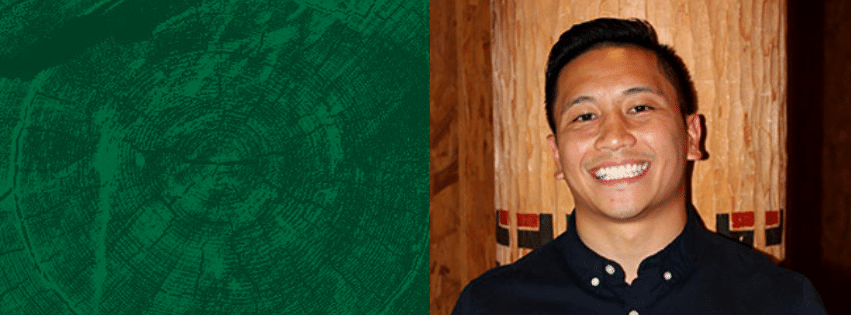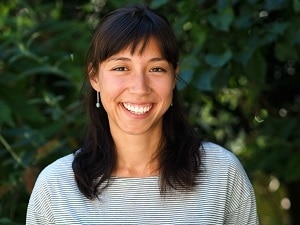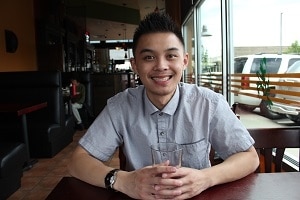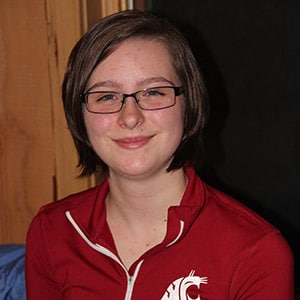If you look at the leaves of the salmonberry, a plant that thrives in the…
Author: Tamar Kupiec
Rico and his classmates followed a trail through the forest and across a meadow to reach the lodge where they would sleep four to a room and relax with friends around a grand, stone fireplace. They had left behind the familiar yellow school buses and now pulled carts loaded with backpacks and sleeping bags.
The cart trail from the parking lot to the lodges isn’t much more than 300 yards, but to Rico Jose, a sixth-grader at Pinecrest Elementary in Bremerton, it felt like a long hike. Rico was no newcomer to the natural world. He was an experienced hiker and loved being outdoors. He grew up fishing with his father and had spent his boyhood exploring the “little paradise” behind the neighborhood high school, catching frogs and crayfish in the stream, studying snakes and insects, and simply enjoying the peace he has always found among the trees. Still, to the excited Rico, the School Overnight Program was to be an adventure, and that kind of excitement has a way of altering a child’s sense of time and space.
His life looks quite different today at the age of 26. A graduate of Olympic College, Rico works as a medical assistant at Virginia Mason Hospital in the podiatry and cardiology departments, a job which gives him great satisfaction. He is a homeowner in his native Bremerton. And he is about to propose to his girlfriend of 15 months. But when Rico entered the IslandWood Welcome Center fourteen years later, it was as if time had stood still. He marveled at his surroundings just as he did the first time, each sight releasing a memory or long-forgotten fact. He ran his fingers over the miniature trees in the model map and recalled the size of the IslandWood campus (“About 250 acres, right?”). He looked up at the 92-foot beam overhead that connects the lobby with the adjoining Great Hall and recalled that it was milled from a local Douglas fir.
Rico surveyed the unpainted wood walls, ceiling, and rafters, admiring their golden color and varied grain. The IslandWood campus was his introduction to buildings with exposed wood interiors. At IslandWood, this is not just a question of the way things look but of how to teach. The buildings are designed to instruct and many of the elements and systems are intentionally left exposed. Just as the students are taught to conserve energy and resources, so do the buildings. They make use of the sun for heat and the wind for ventilation, and they make use of recycled materials, such as salvaged wood and fly ash (a waste product from coal-burning plants). Even the fireplace in his lodge, which so impressed Rico upon arriving, has something to teach. There are five in all, and each one tells a piece of Washington’s geological history through the selection and arrangement of its stones.
As familiar as Rico may have been with the forest, this built environment was a revelation. He was fascinated by the composting toilets, those dark and simple “holes,” which convert waste into soil. He was inspired by the floors made of bamboo, fast-growing and more renewable than wood, he learned. When he returned home, he asked his father, who was building an addition to their house, to put bamboo flooring in his room. His father agreed, and it’s still there today, looking good and prompting conversation with visitors about sustainability. In his own home, Rico recreated the “cabin feeling” he came to love at IslandWood with a rustic facade he made from recycled pallet wood.
Islandwood was where Rico first learned about plant identification. Before the School Overnight Program, luck had kept this hiker away from stinging nettle, but knowledge has protected him ever since. The instructors taught him about what plants you can and cannot eat in the wild. “I didn’t know you could just eat a leaf,” he laughs. “[IslandWood] really opened my eyes to God’s creation, [to] the nature of things, how you can use the environment…in your everyday life.”
As a boy, Rico often had one of those eyes closed and the other pressed to the lens of a microscope given to him by his grandparents. He and his brother were curious and creative scientists. There was nothing that they wouldn’t examine under its powerful lens: leaves, butterflies, and ants, skin and hair, a bumblebee, a beetle leg…. He says he’d like to show IslandWood to his fiancée. In these forests and meadows, lodges and laboratories—and along the cart trail—she will see what he saw then and what he sees now.










